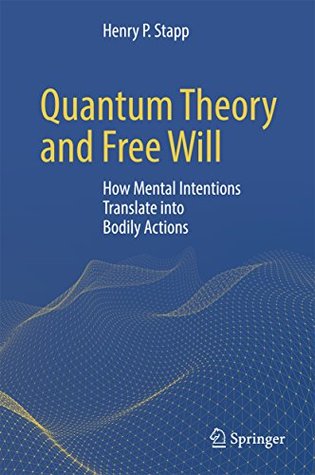Read Quantum Theory and Free Will: How Mental Intentions Translate into Bodily Actions - Henry P. Stapp file in ePub
Related searches:
Quantum Theory and Free Will: Stapp: 9783319583006: Amazon
Quantum Theory and Free Will: How Mental Intentions Translate into Bodily Actions
Quantum Theory and Free Will - How Mental Intentions
FREE WILL, DETERMINISM, QUANTUM THEORY AND STATISTICAL
Quantum physics highlights - Physics and nanotechnology
Quantum Physics, Consciousness, and Free Will - ResearchGate
Quantum Theory and Free Will : How Mental Intentions
Quantum Theory and Free Will SpringerLink
Quantum theory and free will : how mental intentions
Download citation quantum physics, consciousness, and free will this article examines the relevance of quantum mechanics (qm) to the free will debate.
This is the only reasonable solution of the apparent tension between determinism and free will. Quantum theory, statistical physics, neural biology, cognitive sciences, and the rest of the knowledge that we have. Any attempt to link this discussion to moral, ethical or legal issues, as is often been done, is pure nonsense.
When early reports had surfaced that google had achieved quantum supremacy, it was met with skepticism. Even to those that were well-versed in quantum computing, this came as a surprise.
Another definition of free will avoids this problem and throws a monkey wrench into the scientist on the street’s knee-jerk attitude that free will is impossible in a quantum world.
One often hears that quantum theory saves free will from classical newtonian or even darwinian determinism. Investigating such claims, however, quickly gets complicated. Pure “unitary” or “minimal” quantum theory postulates fully deterministic dynamics, but only probabilistic outcomes for observations.
This book explains, in simple but accurate terms, how orthodox quantum mechanics works. The author, a distinguished theoretical physicist, shows how this theory, realistically interpreted, assigns an important role to our conscious free choices. Stapp claims that mainstream biology and neuroscience, despite nearly a century of quantum physics, still stick essentially to failed classical precepts in which mental intentions have no effect upon our bodily actions.
Today's quantum computers - today’s quantum computers are still in the early stages of development. Learn about today’s quantum computers and the latest 16-qubit quantum computer. Advertisement quantum computers could one day replace silico.
Stapp's argument for free will rests on the premise that alternative possibilities are, on the basis of quantum theory and the biological mechanism of ion channels in the brain (13), an ontological reality.
A newly discovered link between string field theory and quantum mechanics could rewrite theoretical physics. If theoretical physicists had their own version of the age-old question about the chicken and the egg, they might instead ask: what.
May 6, 2019 that is for what the universe without quantum mechanics is concerned. Add quantum mechanics, and you introduce a random element into some.
Quantum computing uses quantum mechanics to process enormous amounts of data at an unbelievably high rate of speed. It is setting the stage for a new generation of supercomputers. Quantum computing uses quantum mechanics to process enormous.
An article in scienceworld reports on a proposed experimental setup which would make quantum entanglement visible to the naked eye! using stimulated emission (the same effect that causes lasing), a group led by nicolas gisin of the univers.
Stapp worked with two of the most famous twentieth-century quantum physicists—werner heisenberg and wolfgang pauli. After many decades of study, experience, and writing in this field, stapp has published this book on the relationship between free will and quantum mechanics: quantum theory and free will: how mental intentions translate into bodily actions (cham, sz: springer, 2017).
Jun 9, 2020 and that theory is quantum chemistry, based in the fundamental equation of quantum physics: the schrödinger equation.
: 2–13 these qubits may be designed differently, depending on the full quantum computer's computing model, whether quantum logic gates, quantum annealing, or adiabatic quantum computation. There are currently a number of significant obstacles in the way of constructing useful quantum computers.
Ethics is the branch of philosophy that deals with morality and how it shapes behavior. Different branches of the study of ethics look at where our views of morality come from and how they shape our everyday lives.
Kochen states that if we have a free will in the sense that our choices are not a function of the past, then, subject to certain assumptions, so must some elementary particles.
Quantum theory and free will� how mental intentions translate into bodily actions. [henry p stapp] -- this book explains, in simple but accurate terms, how orthodox quantum mechanics works. The author, a distinguished theoretical physicist, shows how this theory, realistically interpreted, assigns.
A series of theorems about quantum mechanics that began in the 1960s. It asserts, roughly, that if indeed we humans have free will, then elementary particles.
Quantum weirdness occurs when the normal laws and rules can't explain quantum physics. Advertisement superman has his bizarro planet, alice tiptoes through the looking glass and countless other.
We are deeply unpredictable beings, like most macroscopic systems. There is no incompatibility between free will and microscopic determinism.
Jan 28, 2015 some of you may think that the idea that free will and quantum mechanics have anything to do with each other is ridiculous.
Quantum theory and free will: how mental intentions translate into bodily actions.
Discover the world of quantum physics, with information on the history of the field, important principles and equations, and definitions of key terms. Discover the world of quantum physics, with information on the history of the field, impo.
Apr 5, 2018 so, free will is a subjective experience, even in a quantum world.
Since quantum theory is the most fundamental theory of matter that is currently available, it is a legitimate question to ask whether quantum theory can help us to understand consciousness. Several approaches answering this question affirmatively, proposed in recent decades, will be surveyed.

Post Your Comments: